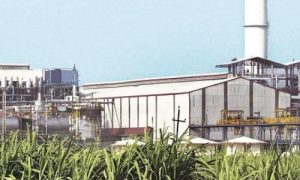Chinese team says carbon dioxide can turn to sugar, offering solution to global problems

Chinese scientists have developed a method to convert methanol—derived from carbon dioxide or industrial waste—into white sugar (sucrose) using enzymes, offering a potential plant-free way to produce food. The system, detailed in *Science Bulletin*, achieves an 86% conversion yield and can also synthesize other carbohydrates like starch and fructose. This innovation could help tackle food security and carbon emissions.
Chinese scientists have developed a method to turn the alcohol methanol into white sugar, which they say could allow captured carbon dioxide to be converted into food.
The team’s biotransformation system produces sucrose without the need to grow sugar cane or sugar beets – crops that require large amounts of land and water resources.
Their method to convert methanol – which can be derived from industrial waste or made by hydrogenating carbon dioxide – into sucrose using enzymes was also adapted to make other complex carbohydrates, including fructose and starch.
Why is the Chinese government so concerned about food security?
“Artificial conversion of carbon dioxide into food and chemicals offers a promising strategy to address both environmental and population-related challenges while contributing to carbon neutrality,” the team said in a paper published in the peer-reviewed journal Science Bulletin in May.
Reducing carbon dioxide to less complex molecules has proven successful, though the researchers said that generating long-chain carbohydrates – the most abundant substances in nature – has proven to be a challenge for scientists.
“In vitro biotransformation (ivBT) has emerged as a highly promising platform for sustainable biomanufacturing,” the team from the Chinese Academy of Sciences’ Tianjin Institute of Industrial Biotechnology wrote.
“In this work, we successfully designed and implemented an [ivBT] system for sucrose synthesis from low-carbon molecules”.
Sucrose, or white sugar, is mainly obtained from sugar cane grown in warmer climates, such as Southeast Asia. The second major source is sugar beets grown in colder northern regions.
While China has the climate conditions to grow both cane and beets, the country consumes 15 million tonnes of sugar a year, 5 million tonnes of which are imported, according to an article published by the Voice of the Chinese Academy of Sciences (CAS) on its WeChat channel earlier this month.
The large-scale cultivation of both crops requires a vast amount of land and water, which is a concern as the global population continues to grow, placing an increasing amount of stress on agriculture as the climate changes.
This has prompted researchers to try to develop methods to synthesise sucrose in a scalable and economically viable way.
In 2021, researchers from the Dalian Institute of Chemical Physics of CAS revealed a high-efficiency, low-temperature method to produce methanol from the hydrogenation of carbon dioxide.
The chemical reduction of carbon dioxide had opened up the possibility of using the captured greenhouse gas as a raw material for the sustainable biosynthesis of various chemicals, the researchers from the Tianjin Institute said.
“This study established several ivBT platforms for the conversion of low-carbon molecules, which can be derived from chemical reduction of CO2 or chemical/biological conversion of industry wastes, into high-carbon (C≥12) sugars,” the team said.
By employing a pathway-scanning strategy to optimise their system, the team was able to develop a pathway with short reaction steps and low energy input, achieving a high conversion yield of 86 per cent.
Their system was not only able to convert methanol into sucrose for the first time, but could also biosynthesise starch with less energy input than previously reported methods.
Building upon their platform, the team also adapted the ivBT system to convert a variety of compounds, including fructose, amylose, amylopectin, cellobiose and cellooligosaccharides.
Can China claim the leadership mantle after the US quits the WHO and Paris Agreement?
“Together, our system provides a promising, plant-independent route for de novo synthesis of structure-diversified oligosaccharides and polysaccharides,” including those used in food and medicine, the team said.
“This work thus lays a foundational framework for the future development of flexible and carbon-negative biomanufacturing platforms.”
The team said further research would be required to make their ivBT systems scalable and robust, including enhanced enzyme screening and improving the platform’s stability.
Source : SCMP














